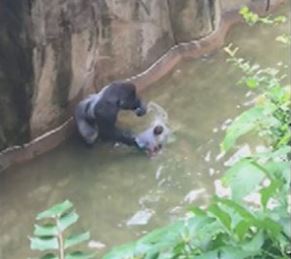 The news made headlines around the world, sparking outrage and protests: a 17-year-old gorilla at the Cincinnati Zoo was killed in order to save the life of a 3-year-old boy who had slipped into the animal’s exhibit. The story has all the elements of a literary tragedy, from the happy beginning to a disastrous ending, with a series of misfortunes leading from one to the other.
The news made headlines around the world, sparking outrage and protests: a 17-year-old gorilla at the Cincinnati Zoo was killed in order to save the life of a 3-year-old boy who had slipped into the animal’s exhibit. The story has all the elements of a literary tragedy, from the happy beginning to a disastrous ending, with a series of misfortunes leading from one to the other.
In another setting, perhaps, the public outcry may have been different. Had the toddler been camping with his parents and carted off by a grizzly bear, then perhaps the boy and his family would be receiving the lavish love of a relieved public—even amidst grief for the death of another endangered animal. But that’s not the story.
Instead, we have as main characters a boy being a boy, curious, adventurous, and predisposed to crossing a clear barrier erected for his own good. We have the boy’s mother, who—like any parent of a 3-year-old boy—undoubtedly gets exhausted just trying to keep his curiosity in check; who would love to keep her eyes on him every second of every day but just can’t (any better than you or I). There are the zookeepers, whose passions and careers center around loving, nurturing, and protecting the animals, and sharing that love with the people—even the ignorant, careless, sometimes stupid people—who visit the zoo. And, of course, there is Harambe, the central character, the majestic silverback gorilla born and raised—and now killed—in this very zoo. Some have suggested that, at least in the first moments, Harambe was even trying to protect the young, frightened, hairless ape who had fallen into his world.
Conspicuously missing from this cast is the nameless, faceless individual who took the shot; the one keeper who most had to face the reality of bringing death to the innocent in order to bring life to the guilty.
The parallels to our lives and the gospel are great.
We—you and I—are the boy. Few would call us evil; we are simply curious, wanting our own way, prone to wander, heedless of the barriers erected for our safety and protection. Or perhaps we are the mother: loving and caring, but tired; perhaps only a momentary lapse has reverberated throughout our lives, bringing guilt, shame, and even notoriety.
Jesus is (I never imagined saying something like this) the gorilla: innocent, loving, and offering safety from the certain death our wandering brings. God is the keeper of this human zoo in which we live. He is the one who gave His Son, Jesus (the gorilla), to live among us. He is the one who “took the shot,” as it were; who ultimately laid that Son on the cross: the innocent dying that the guilty might be made innocent.
And here the similarities end, for in Cincinnati and around the world, voices demand justice for the gorilla and judgment for the boy and his family. in the gospel it is Jesus, the innocent sacrifice, who is mocked and scorned; while the guilty crowds are celebrated in their wandering. In Cincinnati, the gorilla is gone for good; in the gospel, the sacrifice lives again, that the guilty may also live.
In Cincinnati, calls are being made for changes in zoo practices; the gospel calls us to consider what changes we need to make in our own lives. Are you the wandering boy, ignoring the security barriers God has erected? Or are you the mother who turned her back for a moment, now weighed down by guilt and shame?
How can you use the story of Harambe, the silverback gorilla, to tell the story of Jesus, the sacrificial Lamb?
